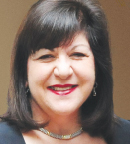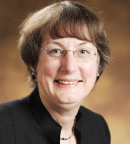“We are in an era of unprecedented scientific opportunities in cancer research,” said Margaret Foti, PhD, MD (hc), Executive Officer, American Association for Cancer Research (AACR), as she introduced the Congressional briefing, “Seizing Today’s Opportunities to Accelerate Cancer Research.”
“Thanks to advances in cancer research, we are now preventing, detecting, diagnosing, and treating many types of this devastating disease with ever-increasing precision and success, and we are constantly discovering new ways to target cancers, ways that

It is only through robust, sustained, and predictable federal funding for research that we can continue to bring hope to the millions of people who are touched by cancer.— Margaret Foti, PhD, MD (hc)
Tweet this quote
were previously unimaginable,” Dr. Foti added. “However, despite the incredible scientific progress that has been made, much more work needs to be done to conquer all cancers, especially the most intractable ones.”
“Vice President Biden’s National Cancer Moonshot Initiative has galvanized the cancer community and has sparked a renewed dialogue on how we can speed the pace of progress for the benefit of all patients. The AACR shares Biden’s vision and passion for ‘ending cancer as we know it.’”
The AACR has been closely engaged with the Administration and the NCI as the Initiative has taken shape. Twenty of the 28 members of the NCI Blue Ribbon Panel are AACR members.
Key Issues
Nancy E. Davidson, MD, AACR President, Director of the University of Pittsburgh Cancer Institute, and Hillman Professor of Oncology at the University, noted that Congress has given the NCI its most significant funding in a decade: $2 billion for FY 2016, and the Senate Appropriations Committee has proposed another $2 billion for FY 2017.
She said that in the past 45 years, the number of cancer survivors has quadrupled (but they’re getting older), and in many respects, they are the “drivers of progress.”

The AACR has established NextGen Grants for Transformative Cancer Research to stimulate highly innovative work from young investigators.… The projects that are funded are anticipated to lead to major breakthroughs in the field.— Nancy E. Davidson, MD
Tweet this quote
That progress has to concentrate on three major areas now: using the knowledge gained from mapping the human genome to create more sophisticated precision medicine; immune-oncology; and screening, early detection, and prevention. “One-third of all cases of cancer are preventable,” she said.
Douglas R. Lowy, MD, NCI Acting Director, said that the Moonshot program will “shine a light on cancer and its Precision Initiative in Oncology (PMI-O).” Clinical trials are the core component of Precision Initiative in Oncology, closely followed by development of preclinical models and a publicly accessible database of the molecular details of about 14,000 cancer cases.
The key issues now, he said, are to improve health care for cancer patients, specifically outcomes and quality of life; develop precision medicine to make treatment more effective and reduce toxicity; perform long-term basic research on cancer prevention; and conduct translational research to improve treatment.
He described the newly formed National Cancer Advisory Board (NCAB) Blue Ribbon Panel that will work with the Moonshot Task Force to provide expert advice on the vision, proposed scientific goals, and implementation of the initiative. It also will examine the opportunities and impediments in cancer research.

NCI-MATCH received strong support from researchers, clinicians, advocates, and patients. In fact, the pace of enrollment exceeded expectations.— Douglas R. Lowy, MD
Tweet this quote
Seven working groups will develop recommendations on expanding clinical trials, enhanced data-sharing, cancer immunology and prevention, implementation science, pediatric cancer, precision prevention and early detection, and tumor evolution and progression. The Blue Ribbon Panel will report the working groups’ recommendations to the NCAB, which will review them and send its report to the NCI Director, who will submit a final set of recommendations to the Moonshot Task Force by this September.
NCI-MATCH
Dr. Lowy also talked about NCI-MATCH, the largest first-of-its-kind precision medicine clinical trial to date. It has two key parts. In the first, tumor samples undergo genomic screening to determine whether they contain specific gene abnormalities (actionable mutations) that can be matched to approved or investigational drugs or combinations being studied in the trial. The second part is assignment of a patient to a treatment arm. Patients who have an actionable mutation are further evaluated for eligibility. NCI-MATCH launched with 10 treatment arms, which have now increased to 24.

The goal is to determine whether treating patients with drugs or combinations that target gene abnormalities believed to be driving their cancer will shrink the cancer, regardless of its site of origin. Treatments that show promise in NCI-MATCH can be advanced to larger, more definitive clinical trials.
“NCI-MATCH received strong support from researchers, clinicians, advocates, and patients. In fact, the pace of enrollment exceeded expectations: Less than 3 months after it was launched, nearly 800 patients had registered for screening,” said Dr. Lowy.
He thanked Congress for its generous funding this year and said, “The future looks really bright.”
AACR Young Scientists Program
Dr. Davidson said that the AACR has always encouraged young scientists and now has established NextGen Grants for Transformative Cancer Research to stimulate highly innovative work from young investigators. It is intended to promote and support creative, paradigm-shifting research that, because of its nature, may not otherwise be funded through existing channels. The projects that are funded are anticipated to lead to major breakthroughs in the field. The grants provide $450,000 over 3 years.
Five young scientists participated in the briefing, and one of them (Dr. Northcott) was a recipient of an AACR NextGen Grant for Transformative Research:
- Kara A. Bernstein, PhD, Assistant Professor, Department of Microbiology and Molecular Genetics, University of Pittsburgh Medical School, is a recipient of a Stand Up to Cancer Innovation Grant. “I’ve always loved puzzles, and working with cancer genomics is proving to be the most challenging one of all.”
- Kenneth Lee IV, MD, PhD, Assistant Professor of Surgery, Hospital of the University of Pennsylvania, is a recipient of the First Friends of the AACR Party With a Purpose Young Scientists Award. He is particularly concerned about pancreatic cancer and how ineffective surgery has been. “We’re doing a little better now with techniques that can highlight tumors and diseased margins, but still we can’t get at the metastases, and the disease always progresses. Surgery alone just doesn’t do it.”
- Christine M. Lovly, MD, PhD, Assistant Professor of Medicine, Division of Hematology-Oncology, Assistant Professor of Cancer Biology, Vanderbilt University School of Medicine, is a recipient of an AACR-Genentech BioOncology Career Development Award for Cancer Research on the HER family pathway. She said that ever since she was 16 years old and an intern at Roswell Park, she has wanted to “integrate the language of medicine and the language of science. Every clinical trial has a foundation in basic science, so every time we learn about how patients react to treatment, we advance the science a little.”
- Paul A. Northcott, PhD, St. Jude Faculty, Department of Developmental Neurobiology, St. Jude Children’s Research Hospital, is a recipient of an AACR NextGen Grant. He specializes in the genomics of pediatric brain tumors. “It’s terrible when adults get cancer, but children have hardly begun to live, so their cancers are even more tragic. As a father of two, I feel a particular urgency about this.”
- Jose G. Trevino II, MD, Assistant Professor, Department of Surgery, University of Florida College of Medicine, is a recipient of two AACR Minorities in Cancer Research Scholar awards. He wants to know why surgery can’t cure cancer and why, despite molecular, genomic, and other similarities among cancers, there remain significant racial and ethnic differences.
Moonshot Blue Ribbon Panel
- Tyler Jacks, PhD (Co-Chair), Chair, Director, Koch Institute for Integrative Cancer Research, Massachusetts Institute of Technology (MIT)
- Elizabeth Jaffee, MD (Co-Chair), Chair, National Cancer Advisory Board, Professor and Deputy Director for Translational Research, Sidney Kimmel Comprehensive Cancer Center, Johns Hopkins University School of Medicine
- Dinah Singer, PhD (Co-Chair), Acting Deputy Director, NCI, Director, NCI Division of Cancer Biology
- Peter Adamson, MD, Professor and Director, Experimental Therapeutics in Oncology, The Children’s Hospital of Philadelphia
- James Allison, PhD, Professor and Chair of Immunology, MD Anderson Cancer Center
- David Arons, JD, CEO, National Brain Tumor Society
- Mary Beckerle, PhD, CEO and Director, Huntsman Cancer Institute, University of Utah
- Mitch Berger, MD, Professor and Chair, Department of Neurological Surgery, University of California San Francisco
- Jeff Bluestone, PhD, A.W. and Margaret Clausen Distinguished Professor of Metabolism and Endocrinology, University of California San Francisco
- Chi Van Dang, MD, PhD, Professor of Medicine and Director, Abramson Cancer Center, University of Pennsylvania
- Mikael Dolsten, MD, PhD, President, Pfizer Worldwide Research and Development; Executive VP, Pfizer, Inc
- James Downing, MD, President and CEO, St. Jude Children’s Research Hospital
- Levi Garraway, MD, PhD, Associate Professor of Medicine, Harvard Medical School, Assistant Professor of Medicine, Dana-Farber Cancer Institute
- Gad Getz, PhD, Director of Cancer Genome Computational Analysis Group and Institute Member, Broad Institute of MIT; Harvard Director, Bioinformatics Program, Massachusetts General Hospital Cancer Center and Department of Pathology; Associate Professor of Pathology, Harvard Medical School; Paul C. Zamecnik Chair in Oncology, Massachusetts General Hospital Cancer Center
- Laurie Glimcher, MD, Professor of Medicine and Stephen and Suzanne Weiss Dean, Weill Cornell Medical College; Incoming President and CEO, Dana-Farber Cancer Institute
- Lifang Hou, MD, PhD, Associate Professor of Preventive Medicine, Robert H. Lurie Comprehensive Cancer Center, Northwestern University Feinberg School of Medicine
- Neal Kassell, MD, Chairman, Focused Ultrasound Foundation; Professor of Neurosurgery, University of Virginia
- Maria Elena Martinez, PhD, Sam M. Walton Endowed Chair for Cancer Research; Professor of Family Medicine and Public Health; Co-Director of the Reducing Cancer Disparities Program, University of California, San Diego, Moores Cancer Center
- Deborah Mayer, PhD, RN, Professor of Adult and Geriatric Health, University of North Carolina School of Nursing; Director of Cancer Survivorship, University of North Carolina Lineberger Comprehensive Cancer Center
- Edith Mitchell, MD, FACP, Professor of Medical Oncology and Associate Director for Diversity Services, Sidney Kimmel Cancer Center at Thomas Jefferson University
- Augusto Ochoa, MD, Professor of Pediatrics and Director, Stanley S. Scott Cancer Center, Louisiana State University
- Jennifer Pietenpol, PhD, Benjamin F. Byrd, Jr. Professor of Oncology; Professor of Biochemistry, and Director, Vanderbilt-Ingram Cancer Center
- Angel Pizarro, MSE, Technical Business Development Manager, Amazon Web Services and Scientific Computing and Research Computing
- Barbara Rimer, DrPH, Alumni Distinguished Professor and Dean, University of North Carolina Gillings School of Global Public Health
- Charles Sawyers, MD, Chair, Human Oncology and Pathogenesis Program, Memorial Sloan-Kettering Cancer Center, Investigator, Howard Hughes Medical Institute
- Ellen Sigal, PhD, Founder and Chair, Friends of Cancer Research
- Patrick Soon-Shiong, MD, FRCS (C), FACS, Founder, Chair, and CEO, Nantworks, LLC
- Wai-Kwan Alfred Yung, MD, Professor of Neuro-Oncology and Chair of Clinical Cancer Care, MD Anderson Cancer Center
Ex Officio Members:
- Robert Califf, MD, Commissioner, U.S. Food and Drug Administration
- David Atkins, MD, MPH, Acting Chief Research and Development Officer, Department of Veteran Affairs
- Jason Paragas, PhD, Director of Innovation, Lawrence Livermore National Laboratory
- Lawrence Tabak, DDS, PhD, Principal Deputy Director, National Institutes of Health
- Jonathan Woodson, MD, Assistant Secretary of Defense (Health Affairs), Department of Defense ■

